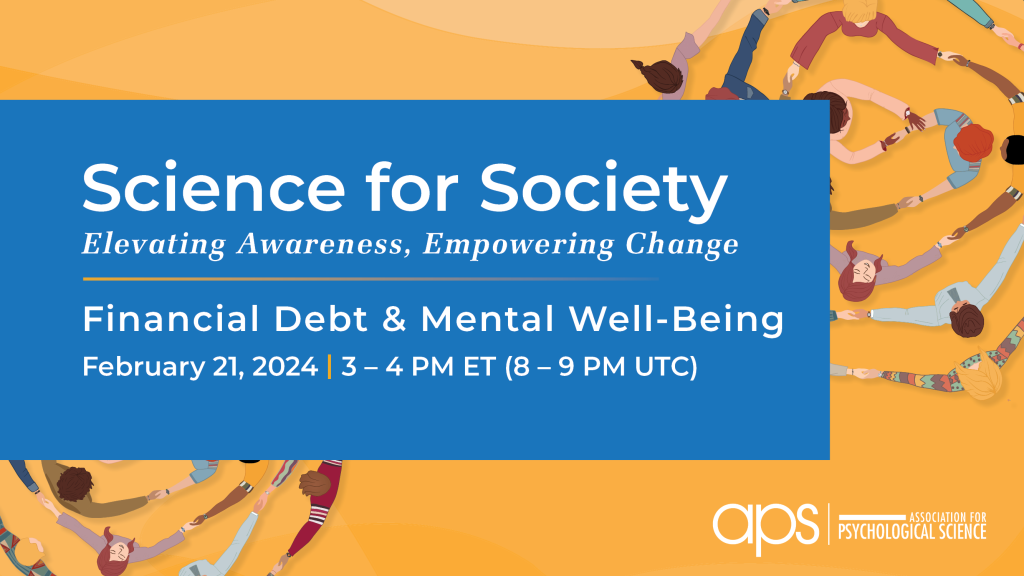Spending, Saving, and Owing: How Finances Intersect with Behavior and Emotions

Science for Society is an APS webinar series focused on educating the public and bringing psychological science to decision-makers working to solve real world problems. In addition to psychological scientists, participants include public policy decision-makers, news reporters, advocates, and scholars from adjacent fields.
Financial journalist Mona Chalabi once described her fears of destitution, despite her relative financial security. She described this emotion “money dysmorphia.”
“I worry that if I actually let myself accept that I have money now, it will be even more of a shock if poverty does come,” Chalabi wrote in a 2019 article for The Guardian.
The psychological burden that money creates, even in the best of times, was the focus of “Financial Debt and Mental Well-being,” an APS Science for Society webinar held February 21.
University of Michigan scholar Scott Rick, who studies consumer financial decision-making, pointed to Chalabi’s piece to describe differing attitudes about spending and saving. Many people resist spending money as a protective response to real or perceived economic distress, he said.
“It can make sense in that time when things are tight,” Rick said. “But if your career gets better or you come into some money later in life, it can be hard to shake these reactions that were formed in your formative years.”
Rick discussed his research on spending mindsets, including their effects on relationships. Joining him on the webinar were clinical psychology researcher Robert F. Krueger (University of Minnesota) and Min Zahn, professor in the School of Social Work at the University of Illinois-Champaign. Krueger, a top investigator in the federally funded Midlife in the United States study, discussed his research on the Great Recession’s impact on individuals’ mental health.
Zahn discussed her findings about the financial stressors among young adults, particularly those with student loan debt. Borrowers in minority groups grappled with an especially large amount of stress, largely because of systemic racism that impedes their job attainment and income, she added. Zahn and Krueger emphasized the need for young adults to receive better financial literacy training as a way to help young people understand borrowing, saving, and money management.
A recording of the webinar is available below for registrants and APS members.
The full webinar is available to APS members and registered attendees.
Related content we think you’ll enjoy
-

Empirical Evidence Is My Love Language
Teaching: The idea of love languages has become hugely popular and the term itself is pervasive in popular culture. This article provides teaching materials to encourage students to think critically about psychological science and popular self-help advice.
-

We All Love to Be Loved, But Women May Experience Love More Frequently than Men
Conventional wisdom holds that men and women approach romance differently. But new research suggests that love is important for well-being regardless of gender—and the differences that do exist may hint at the evolutionary basis of love.
-

Social Class Determines Whether Buying Experiences or Things Makes You Happier
What is the best way to spend money to increase your happiness? A series of studies suggests that it may depend, in part, on how wealthy you are.
Feedback on this article? Email [email protected] or login to comment.





Comments
Thank you for posting this seminar online. In future, would it be possible to use a platform that allows full-screen viewing (as we show these in virtual meetings).
The first and third presenter were especially on-topic & helpful for sharing with post-secondary student clients. #3 told an engaging ‘story’ of the data, which was very appreciated. My accountant partner guessed every conclusion but was edified that there was a match.
Thank you for your comment. APS is currently looking into options that would allow full-screen viewing for webinars going forward.
APS regularly opens certain online articles for discussion on our website. Effective February 2021, you must be a logged-in APS member to post comments. By posting a comment, you agree to our Community Guidelines and the display of your profile information, including your name and affiliation. Any opinions, findings, conclusions, or recommendations present in article comments are those of the writers and do not necessarily reflect the views of APS or the article’s author. For more information, please see our Community Guidelines.
Please login with your APS account to comment.